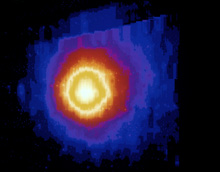Good afternoon.
One more to follow up on the last on how missions have been reported by the
press.
Robert mentions Reginald Turnhill (Reginald Turnill - The Moonlandings: An
Eyewitness Account). I have the book and found it very interesting. Thanks
much to you folks on the other side of the pond from me. - LRK -
------------------------------------------------------------
The Moonlandings: An Eyewitness Account
http://www.amazon.co.uk/exec/obidos/ASIN/0521815959/026-2072578-9005212
Synopsis
The Soviet-American race to land the first man on the Moon was a technical
challenge unlike any other in recent human history. Reginald Turnill, the
BBC's Aerospace Correspondent, covered the entire story first-hand, and his
reports were heard and seen by millions around the world. With unparalleled
access to the politicians, scientists and technicians involved in the race
to the Moon, Turnill got to know all the early astronauts - Alan Shepard,
John Glenn, Neil Armstrong, Buzz Aldrin - as they pioneered the techniques
that made the Moon landings possible. He became a friend of Dr Wernher von
Braun, the German rocket pioneer and mastermind behind it all. This unique
eyewitness account of one of the most thrilling adventures of the 20th
Century is written in a lucid style, packed with action and drama, and is a
fascinating read for all those interested in the story of the race to the
Moon.
------------------------------------------------------------
Hope we get some more reporting of the same caliber for the Moon - Mars
missions. - LRK -
To dream the dream. :-)
Larry Kellogg
larry.kellogg at sbcglobal.net
https://news.altair.com/mailman/listinfo/lunar-update
http://kelloggserialreports.blogspot.com/
http://lkellogg.vttoth.com/LarryRussellKellogg/
=============================================================
[this was posted by Robert Law on the InsideKSC list in response to Jim
McDade's "one man" National TV Space Coverage Championship Poll: - LRK -]
--------------------------------------
Jim,
SPACE REPORTING FROM ACROSS THE POND
During the Apollo Program hear in the UK we only had 2 TV stations BBC
and ITV both provided coverage The BBC began with Cliff Michimore who was
more famous for the Holiday Program to anchor there coverage along with a
panel of experts which included Patrick Moore (who had contributed to
Lunar Mapping pre space age) They built a big space studio to present there
coverage behind the desks suspended from the ceiling was a huge moon globe.
one rumor about this globe was that originally it was a prop for 2001 which
had been rejected because Stanly Kubrick thought the craters where to deep
!. The BBC used the theme music of 2001 to introduce these programs.
During the coverage of the Apollo 8 mission in 1968 at the most critical
moment when the astronauts where about to fire the SPS for the journey home
the BBC cut the program to show Play School ! as the Apollo program
progressed the BBC decided to get a space corespondent this was James Burke
who had been on the science program Tomorrow's World , more recently he has
done Connections which is shown on the Discovery Channel, I thought James
Burke was excellent and so was Patrick Moore
The Space Studio also imputed to the News programs The BBC sent there Air
correspondent Reginald Turnhill to cover these mission from the USA ( I had
the Honor of Meeting Reg in 2003 ) Reg is a real expert in spaceflight he
also flew in the early test flights of Concorde and is famous for his
observers books of spaceflight , more recently he has written The Moon
landings which tells the story of his space reporting. he was the first
reporter to Brake the Apollo 13 story ! as the Apollo program continued
these programs got better and for the final Moon Shot James Burke and
Patrick Moore went to Florida to cover the flight from the USA via Satellite
, these programs broke many firsts in broadcasting technology in the history
of British Broadcasting. Unfortunately very Little remains as the BBC
scrubbed most of the tapes to re use for sports coverage .
ITVs coverage was provided by ITN the ITV system consisted of lots of
regional company's in those days this caused problems for ITN (Independent
Television News) as they had to fight to get to show the space coverage ,
for Apollo 11 it was awful they had a verity night from a theater hosted by
David Frost only cutting to ITN as Armstrong stepped of the ladder !
The First ever News at Ten in 1967 had coverage of preparations for Apollo
7. but like the BBC as time went on ITNs coverage improved There space
expert was Peter Fairlie who always talked about the Moon Ship etc where
as James Burke was fluent in NASA , CM etc.
ITNs studio was a lot smaller than the BBC and there programs where
introduced by space sounding music which I preferred rather than the music
the BBC used.
I was very young back then 9 in 1969 ! but unfortunately space has never had
the same level of reporting since a few more comments
SKYLAB
There was very Little coverage I remember watching the Saturn V launch live
after that very Little, ITN covered the story of Arabela the Spider ! and
Patrick Moore had James Burke on his Sky at Night Program to talk about
Skylab.
APOLLO SOYUZ
I was 15 and it happened during the School Holidays in fact 30 years ago
this week i think !
The BBC had excellent coverage of this with a space studio , The Moon Globe
had been replaced with a Large globe of the world and models of Apollo and
Soyuz suspended from the ceiling ! again James Burke the music to introduce
these programs was "Fanfare for the common Man" Arron Copeland.
This was the first space flight I had seen in Colour as my friend Eric's
parents had just bought a new coulor TV. this of course was also the first
time we had live coverage of the Soyuz launch , in the UK this happened in
the morning and Apollo went about 7PM again the BBC coverage was far
superior than ITNs because they had more time. one of the highlights for me
was when the sports program was cut for space ! I think this was the
docking.
VIKING
The BBC did a live program on July 4 1976 for the mars landing and James
Burke reported live from America unfortunately the Viking landings where
delayed and this spoiled the program as there was no pics from Mars !
SPACE SHUTTLE
In 1981 both ITV and BBC covered the Launch of Columbia and this time ITNs
coverage was far superior than the BBCs . ITN constructed a Space Studio
the programs where anchored by Sir Alister Burnett (News at Ten) and in the
studio with him was Dave Scott of Apollo 15
The program was introduced with fireballxl5 type space music. there was
coverage of the launch then a shorter program with coverage from orbit and
news reports on the ITN news from the Space Studio and coverage of the
Landing.
The BBC coverage was done by the Tomorrow's World program I was
disappointed that James Burke was not doing the coverage. for the opening
music again Copeland was used "Rodeo" the next track on the LP from Apollo
Soyuz !.
STS 2
ITN again provided coverage from there space studio this time with Dick
Gordon APOLLO 12
The BBC was reduced to coverage of the launch on Radio 2 Pathetic !
SPACE SHUTTLE ERA 1982-2005
>From STS 3 until Discovery's return to flight in 1988 we had no live
coverage and had to make do with the ordinary news reports I bought a VHS
video for sts 1 and have a huge collection as I record and watch all space
missions (Apollo has a lot to answer for !)
By the Time of the first Shuttle flights Reg Tunrnhil was forced to retire
from The BBC due to his age and became a freelance space reporter (see his
book Moon landings ) he began to provide live reports over the phone to the
children's news program Newsround these where more accurate than what we
where getting in some of the main news programs.
In a rare event in 1983 the ITV breakfast station TVAM covered the first
Night Launch of the space shuttle Challenger , which was the start of lots
of space items on this program over the years sadly in 1991 they lost the
franchise
Over the years ITNs reporting was away ahead of the BBC which tended to be
very negative
in 1985 ITN even arranged a schools experiment in Space which sadly was
delayed by the Challenger accident. The BBC Newsround program was on air
but not showing live pictures of the launch but after the explosion went to
it so they broke the story in the UK.
RETURN TO FLIGHT (1988)
The BBC provided live coverage of the launch of STS26 they had James Pike
reporting live from KSC since 1988 the BBC has now moved ahead of ITN in
its space reporting which douse not seem to be bad as it was in the 80s .
with BBC NEWS 24 they can now cover launches live . there was no live
coverage planed for Discovery last week but we now have the 24 hour news
channels for that.
CNNI
In 1991 I got a Satellite dish installed for CNN which covers the Launches
in the 1990s we had John Holiman who I thought was excellent as a space
reporter he was full of enthusiasm he would keep going when they tried to
move on to the next item!. when I heard the news that John had been killed
in a car crash it was a very sad day for me ,like the Challenger Disaster or
the loss of Columbia.
Unfortunately over the Year's CNNI has less US programing and we do not get
the same amount of coverage as CNN USA we do not see much of Miles O'Brien
in fact Deep Impact was covered from London by the Technology Corespondent.
Now adays it is the INTERNET and Broadband if only we had that in the 70s !
Robert
....
Make sure to visit the Flagship website:
http://www.insideksc.com
<*> To visit your group on the web, go to:
http://groups.yahoo.com/group/inside_ksc/
=============================================================
"Now adays it is the INTERNET and Broadband if only we had that in the 70s!"
hmmmm, seems it will be possible for YOU ALL to participate in reporting
what you see happen for the missions of the future. It certainly will be
possible for you to voice your opinions on what you think the future should
be like, and then take action to "Make It So!".
Thanks for looking up with me.
- LRK -
=============================================================
WHAT THE MIND CAN CONCEIVE, AND BELIEVE, IT WILL ACHIEVE - LRK
=============================================================
Many folks would like to see us back on the Moon and developing its resources.
Saturday, July 16, 2005
Subscribe to:
Post Comments (Atom)





No comments:
Post a Comment
Note: Only a member of this blog may post a comment.